Quoi qu’on dise, un mariage raté est quand même plus joyeux qu’un enterrement réussi.
No matter what they say, a failed wedding is still more joyful than a successful funeral.– Yvan Audouard, French journalist and writer
In May 2013, France became the 14th country in the world to pass marriage equality reform. This is surprising for a country where only 45 percent of the adult population is married, a rate in steady decline since WWII¹. As the legal and societal take on the institution of marriage has evolved over the years, there are some things however that haven’t changed much: cherished wedding traditions and French bureaucracy. This post covers both, along with our tips for getting married in France.
What is a French wedding like?
Hiring a wedding planner in France can help with the stress!
Leading up to the wedding, the couple is celebrated by friends at a get-together called l’enterrement de vie de célibataire (literally the burial of single life) or l’enterrement de vie de jeune fille (EVJF) for the future bride and l’enterrement de vie de jeune garcon (EVJG) for the future groom. The French equivalent of a stag night was started for men in the 18th century, when the future groom was usually brought on a drunken trip to the maison close (bordel) – women didn’t begin having their hen nights/bachelorette parties until the 1970’s. Today, the EVJF and EVJG have taken a turn toward culture and well-being with activities like cooking classes, adventure courses, days at the spa and scavenger hunts – although the bride and groom are still often dressed up to attract attention from passersby and, like in the US, there are still some bachelor(ette)s being treated to a striptease or two at the end of the soirée.
Once the future bride and groom have buried the past, it’s time to move on to serious business.
The civil ceremony, mariage civil is the only wedding ceremony that is recognized by law in France and must precede any religious ceremony. In front of the mayor or another city representative, and at least two witnesses (témoins), the couple vows “mutual respect, fidelity, help and assistance” as well as the joint responsibility for their children’s upbringing.
Traditionally the doors of the salle des mariages at city hall are meant to stay open throughout the ceremony, allowing anyone from the public to enter to oppose the marriage, if need be. Speak now or forever hold your peace!
Les animations de mariage
When the mayor has pronounced the words “unis par le mariage,” the civil ceremony ends, and the newlyweds are presented with their livret de famille. The small moleskin covered booklet serves as the official public document which will stay with the couple and their children throughout their entire life: marriage, births, divorce and death.
If a religious ceremony is planned, this is usually when the wedding moves to their place of worship. After all the ceremonies – it is time to celebrate! Many couples invite guests to a vin d’honneur, a cocktail party with drinks and nibbles where guests can congratulate the couple and their parents. This event is a bit less formal and often includes members of the community or distant relatives that are not invited to the reception.
Le repas de noce – the wedding feast. Whether it’s a five-course sit-down affair with servers, a family-style buffet or an extended cocktail party called apéritif dinatoire, every reception I’ve ever been to has had at least three things in common: le champagne, la pièce montée and les animations de mariage. “I was surprised at what a time-consuming affair a French wedding is!” said Dennelle. “In the US, they are usually over in less than six hours, but in France sometimes the dessert course barely begins before midnight, and the dancing can go on past 4 AM.”
Le Champagne – not surprising that in the homeland of bubbly wine, wedding toasts are done with Champagne. Tchin tchin et Vive les mariés!
The impressive yet kitsch croquembouche wedding cake
La pièce montée, most often a croquembouche (literally crunches in the mouth) is a delicious dessert made of cream puffs glued together with nougatine and spun sugar. Although the trend of traditionally American multi-tiered wedding cakes, covered with fondant and flowers, has inevitably made it to France, traditionalists are still holding on to the impressive but slightly kitsch pièce montée.
Les animations de mariage: the French have a fantastic way of celebrating the happy couple with a series of skits, presentations, songs and gags that make up the wedding show. Often organized by the witnesses and friends, the animations can range from the classic throwing of the jarretière (garter) to high tech sound, light and video shows tracing the couple’s life all the way back to their days in diapers. A break from all the pomp and circumstance of the traditional wedding reception, les animations make for great laughs and emotions.
What are the traditions when getting married in France?
Antique chambre pots for quirky pot de chambre tradition.
A blog about getting married in France wouldn’t be complete without mentioning what I would have to call insolite – a few unusual and quirky French wedding traditions that make the experience oh la la so much more unique.
La voiture balais – the broom wagon was originally invented for the Tour de France, to sweep up cyclists straggling behind. It has since been adopted to do the same as the wedding party and their guests travel between the ceremony and reception locations. Where in the US we tie cans and a “just married” sign to the bumper of the car, in France they tie brooms and even cardboard cutouts representing the newlyweds, often with their necks tied to the broom… La corde au cou!
La soupe à l’oignon – another unique tradition consists of friends and family making and serving French onion soup. Legend has it that Louis XV invented this recipe one evening when the only ingredients he had on hand were onions, butter and champagne. Over time it became a common wedding tradition to wake the newlyweds just after they’ve headed to bed and serve them this dish, and now it can be served to all of the guests still remaining in the wee hours of the morning.
Le pot de chambre – an odd concoction of leftover alcohol (champagne, wine, liqueur) sometimes mixed with melted chocolate, lady fingers and…often toilet paper, mixed in a (clean) chamber pot and served to the newlyweds, woken (yet again) in the middle of their wedding night by giddy friends and family.
Confetti covered newlyweds leaving the mairie
Exhausted, well-fed and happy, the newlyweds can now think about their lune de miel (honeymoon). Thanks in part to generous monetary gifts from their guests, les nouveaux mariés will be able to start their new life together.
Renestance Tips for Getting Married in France
Getting married in France entails a slew of obligations and procedures you just cannot ignore. Both parties must:
- be at least 18 years old (some exceptions exist),
- be either single, widowed or divorced (ie: not married),
- consent willingly and freely to the union and
- not be related by blood or marriage.
The wedding can only take place in a city or town where at least one of the parties has a residence or a direct connection (for example, their parents live there). Again it’s important to plan ahead as the administrative obligations can delay a ceremony if they are not done in a specific order.
You must gather the following documents in your dossier de mariage to be submitted to the city hall of the commune where you will be getting married:
- Proof of identity: ID like a passport plus a certified and translated copy of your birth certificate (issued less than 3 months before you submit the application if you were born in France and less than 6 months before if you were born in another country).
- Proof of residence: remember that one of you must be a resident (or have a parent who is) of the city in which you are getting married for at least one month before the marriage application is submitted. Documents that serve as proof of residence include rental receipts, utility bills or tax returns.
- If you have signed a contrat de mariage (prenuptial agreement), the notary will give you a certificate that must also be part of your dossier.
- As a foreign national, you will also need to provide a certificat de capacité au mariage, certifying that you are not already married in your home country. This document can take a very long time to obtain so please plan accordingly.
- You may also need to obtain a certificat de coutume which will guarantee that your marriage will be recognized both in France and in your home country. For more information, visit your home country’s embassy or consulate in France.
At this time the city hall will review your marriage application and decide whether or not the wedding can take place, and more specifically if there is mutual consent from both parties. An interview can be scheduled with the future couple in order to clarify the situation. For binational couples the city officer will try to determine if there is a real relationship between the future spouses or if the union is simply a means of immigrating to France.
Once the mairie has reviewed and approved the dossier de mariage, a process which takes a month or more if you are not French, the bans will be published at least ten days before the ceremony announcing the wedding to the public. Originally introduced to help prevent cases of incest, the mandatory publication des bans is a public announcement, which lists the names, birth dates, professions and home addresses of the future bride and groom as well as the wedding’s location. This is meant to give anyone who wishes to oppose the marriage the opportunity to do so before the ceremony begins.
The ceremony is always conducted in French, therefore a certified public translator must be present if either of you does not speak fluent French. You can obtain a list of certified translators from the mairie.
Are you thinking about getting married in France? Contact us if you would like more information or help planning your dream mariage!
References
1 http://www.insee.fr/fr/themes/tableau.asp?reg_id=0&ref_id=NATTEF02311
Jennifer was Renestance's Activity & Excursions Coordinator between 2015 and 2020, a bilingual American from Vermont who's been loving her life in France since 1998. She was passionate about sharing her knowledge and allowing you to discover all of the scenic, cultural and culinary wealth of the Languedoc-Roussillon region.
All articles by: Jennifer Rowell-Gastard

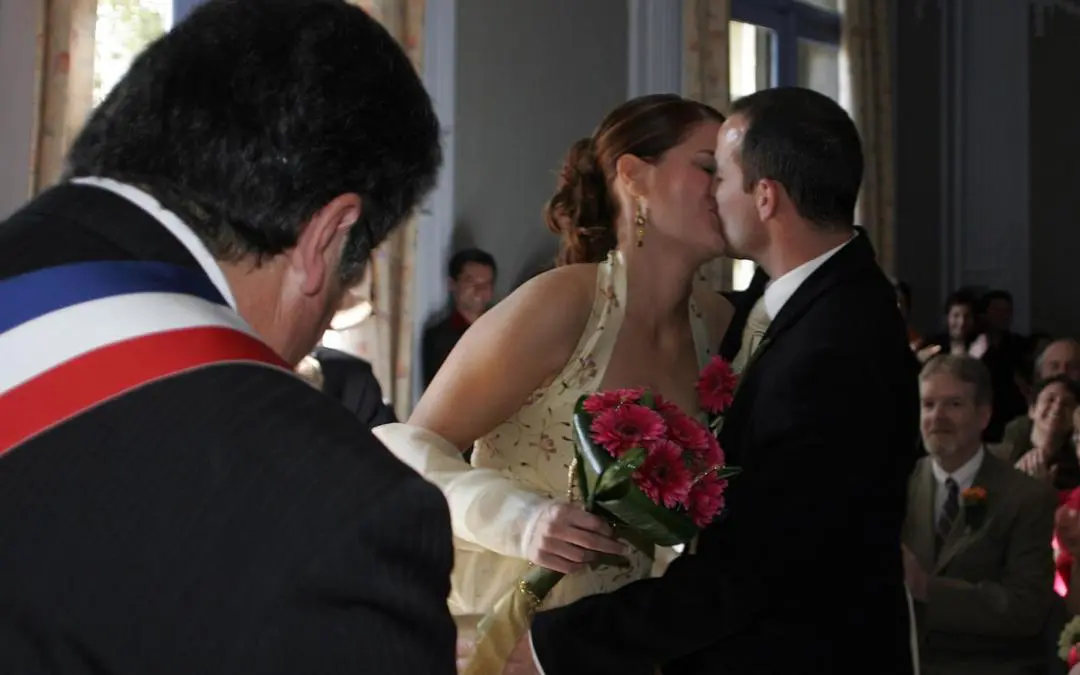

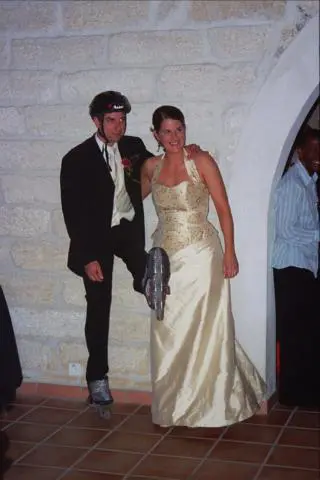
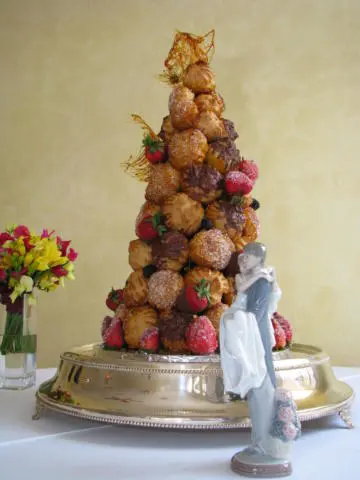

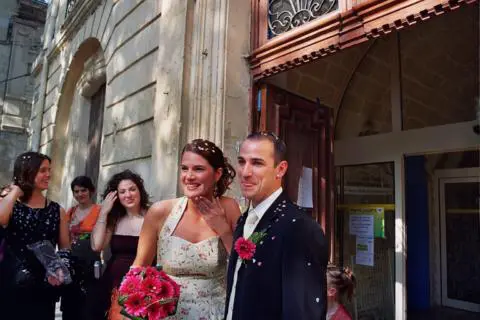
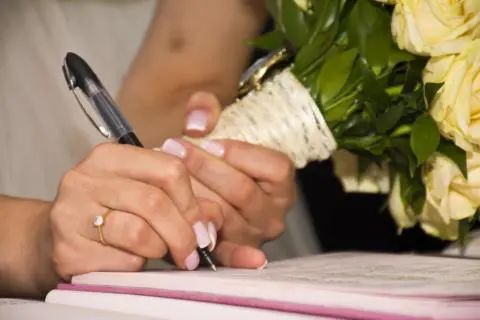

P Hunt
on 2018-07-25 at 12:35What type gifts do guests usually bring?
Great question! Couples usually provide a gift registry, as in other countries, but it’s also common to contribute money toward the honeymoon.
tatiana
on 2019-02-08 at 16:49hi
i recently got married to a french man and I am having trouble with the paper work and or visa needed to stay and live here. They tell me that I may have to go back to my country to get my long term visa and then come back. Or otherwise stay in france for 6 months and somehow prove that i am living here. It is confusing and difficult. Anyone have any advice?
thank you!
Hello Tatiana,
First of all, congratulations!
Technically you need to have entered France with a long stay visa called a VLS-TS (valid 1 year and renewable).
After one year, you can apply for a carte de séjour de séjour vie privée et familiale as the spouse of a French citizen.
After three years of residence, you can apply for a carte de résident (valid 10yrs).
Of course this is all under the condition that you are still married and have not been separated.
Note: under certain conditions you can obtain the “vie privée et familiale” card your first year, even if you’ve arrived without a long stay visa.
Which Préfecture did you speak to about this?
If you’d like any further assistance, please contact us.
Best wishes!